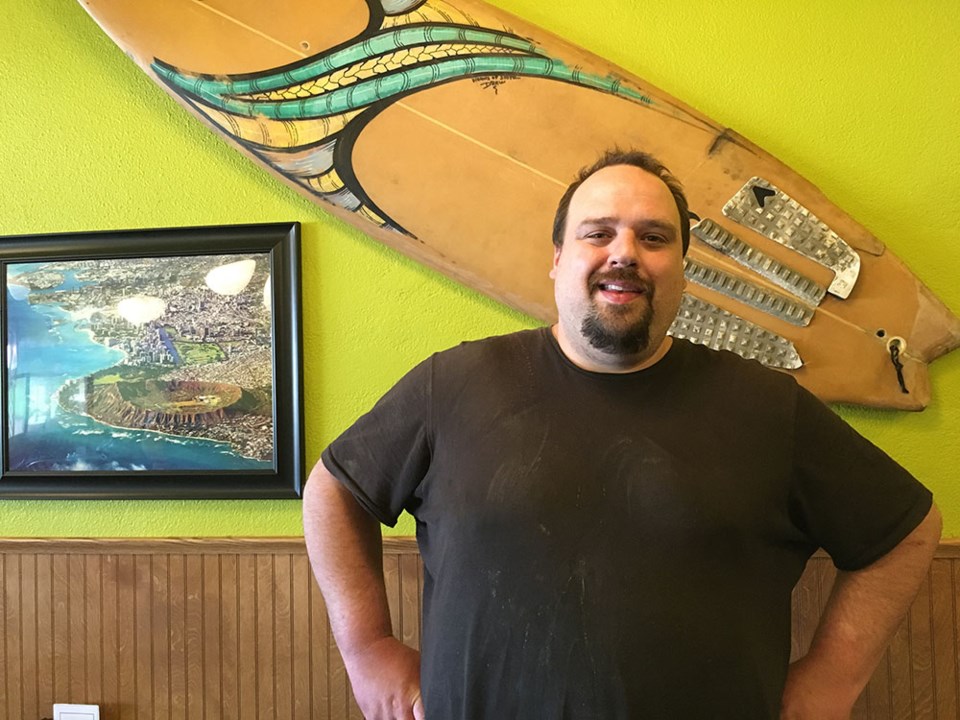Williston, N.D.– You don’t have to go far in Williston, N.D., to find oilfield workers who have been displaced by the bust but are still finding a way to make it.
In downtown Williston is the Hula Grill, a Hawaiian-themed restaurant with unbelievably good ribs. Making those ribs is Stephen Swenson, from Washington state. He came to Williston to work in food services in what American’s call “man-camps.” That work dried up not long after he arrived.
“I’ve been here since August 2014,” he said. “I worked in Alaska in man camps.”
At Williston, he’s worked at two such camps – Black Gold Oilfield Services, with 400 beds, and ATCO’s camp, with 200. He worked at ATCO first.
“I was the warehouse manager in charge of all purchasing for the ATCO camp. ATCO had one huge contract with Sanjel, but it closed when Sanjel pulled out in 2015,” Swenson said. At Black Gold, he was alternate chef.
Both ATCO and Sanjel are Canadian companies. Sanjel's fracking business has since gone out of business this past spring. ATCO closed its Estevan camp as well, prior to closing Williston.
At Black Gold, they were averaging occupancy rates of 90 per cent full in January 2015, with about eight different contracts. “The first wave of major layoffs was March 2015,” Swenson said. By June, their occupancy was down to 30 per cent.
Camps work on a percentage – with roughly one worker for every 10 occupants. So when occupancy declined, so did the camps’ staffing.
“What really hit was our drilling and fracking companies first. Calfrac went from 200 to 100 by March, then down to 36 by July 2015,” he said.
In the boom times, camps could get from $140 to $170 a night for a single room, including meals. Contracts resulted in better deals. Rates dropped with demand.
“We dropped to $80 to $85 a night,” he said.
By the summer of 2015, his camp work ended.
“I wanted to do something away from the oil business. That’s why I started here (at the Hula Grill) in July 2015,” he explained.
The downturn has been evident in the community, as well. “It used to take me 30 minutes to get downtown from the north end. Now, it takes me 10 minutes,” Swenson said.
Rents have dropped 50 to 60 per cent. Swenson’s two-bedroom, 850 square foot townhouse went from $2,250 a month with no extras to $1,100 a month, including water and garbage pickup. That makes a big difference on a wage that is no longer at the oilfield pay scale.
“I was making really good money in the man camps. I don’t think anyone really budgeted.
“I think it makes it back to normal. In Walmart, people picked stuff off pallets. Now it’s fully stocked. The lines are dead now. I used to have to wait 45 minutes to an hour to pay for something. Day-to-day life is much better now.”
Crime has gone up, he noted, particularly petty theft.
Swenson is married, and has three children. He said their school went from 240 to 170 kids as families left.
“Speaking to locals, most are happier life has slowed down. You see oil workers doing normal jobs. Rig workers who made $100,000 a year are applying for delivery jobs.”
Swenson added, “I got lucky with this job. If it wasn’t for this job, I would have gone home (to Washington).
“Everyone has hope oil will go back up. I don’t think it will be a real boom stage.”
Swenson lived in the San Francisco Bay Area for 13 years and lived through the dot com tech boom there, where $100,000 a year couldn’t get you a decent place to live.
In the aftermath of the economic downturn, a place like Williston, with plentiful jobs, was a sanctuary, he explained.




